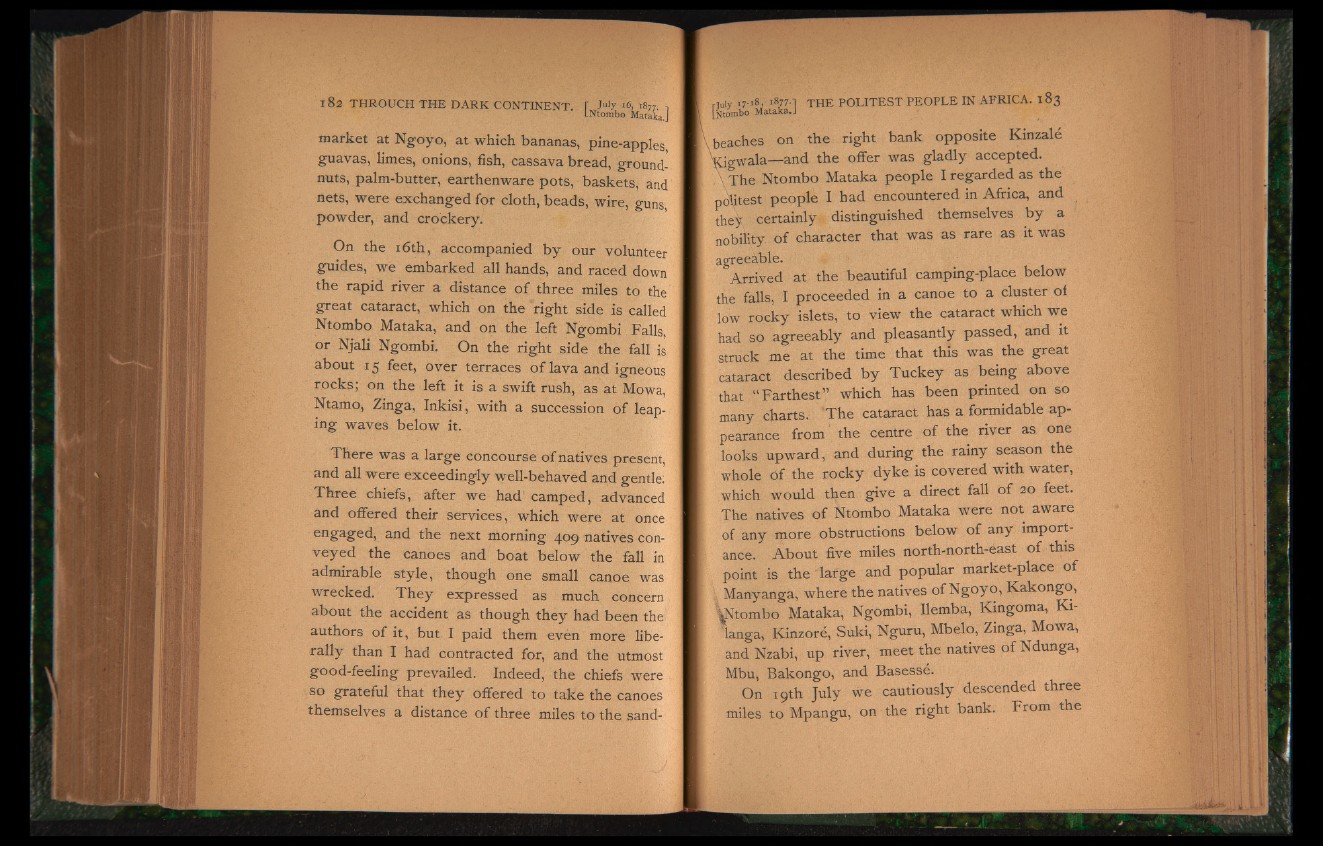
market at Ngoyo, at which bananas, pine-apples
guavas, limes, onions, fish, cassava bread, groundnuts,
palm-butter, earthenware pots, baskets, and
nets, were exchanged for cloth, beads, wire, guns
powder, and crockery.
On the 16th, accompanied by our volunteer
guides, we embarked all hands, and raced down
the rapid river a distance of three miles to the
great cataract, which on the right side is called
Ntombo Mataka, and on the left Ngombi Falls,
or Njali Ngombi. On the right side the fall is
about 15 feet, over terraces of lava and igneous
rocks; on the left it is a swift rush, as at Mowa,
Ntamo, Zinga, Inkisi, with a succession of leaping
waves below it.
There was a large concourse of natives present,
and all were exceedingly well-behaved and gentle:
Three chiefs, after we had camped, advanced
and offered their services, which were at once
engaged, and the next morning 409 natives conveyed
the canoes and boat below the fall in
admirable style, though one small canoe was
wrecked. They expressed as much concern
about the accident as though they had been the
authors of it, but I paid them even more liberally
than I had contracted for, and the utmost
good-feeling prevailed. Indeed, the chiefs were
so grateful that they offered to take the canoes
themselves a distance of three miles to the sandr
July 17-18, 1877 -1 THE POLITEST PEOPLE IN AFRICA. 18 3
[litoinbo Ma ta k a . J
beaches on the right bank opposite Kinzale
•gwala— and the offer was gladly accepted.
The Ntombo Mataka people I regarded as the
politest people I had encountered in Africa, and
tbey certainly distinguished themselves by a
nobility of character that was as rare as it was
agreeable.
Arrived at the beautiful camping-place below
the falls, I proceeded in a canoe to a cluster of
low rocky islets, to view the cataract which we
had so agreeably and pleasantly passed, and it
struck me at the time that this was the great
cataract described by Tuckey as being above
that “Farthest” which has been printed on so
many charts. The cataract has a formidable appearance
from ' the centre of the river as one
looks upward, and during the rainy season the
whole of the rocky dyke is covered with water,
which would then give a direct fall of 20 feet.
The natives of Ntombo Mataka were not aware
of any more obstructions below of any importance.
About five miles north-north-east of this
point is the large and popular market-place of
Manyanga, where the natives of Ngoyo, Kakongo,
Wtombo Mataka, Ngombi, Ilemba, Kingoma, Ki-
langa, Kinzore, Suki, Nguru, Mbelo, Zinga, Mowa,
and Nzabi, up river, meet the natives of Ndunga,
Mbu, Bakongo, and Basesse.
On 19th July we cautiously descended three
miles to Mpangu, on the right bank. From the